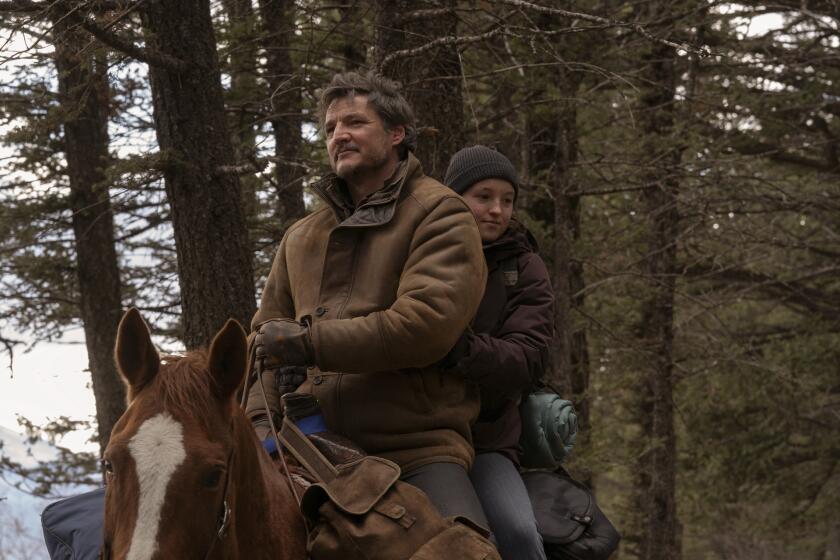Why so few Sept. 11 films?
- Share via
Dream-like images of Tom Hanks in free fall. Loud, crushing sounds. Pieces of paper showering down from the skies. Test screenings of “Extremely Loud & Incredibly Close,” the Tom Hanks-Sandra Bullock post-9/11 film, which opens on Christmas Day, reportedly began with visual and aural reminders of the World Trade Center disaster. If those scenes remain in the finished film — an unanswered question as of press time as Warner Bros. did not respond to requests to discuss the movie and it isn’t slated to
screen again until Friday at the earliest — it means director Stephen Daldry’s work will be one of the very few Hollywood productions to deal with the events of Sept. 11, 2001, let alone show scenes from that day.
Which says a lot about how the film industry has tiptoed around this national tragedy.
“It’s been covered almost too carefully,” says film critic Marshall Fine of Hollywoodandfine.com. “They’ve been so worried about offending somebody’s sensibilities that they’ve held off. There’s so much caution. We live in a time when every little perceived slight can turn into a cause celebre because of the Internet.”
“Has any event in history been so visually documented and seen from every possible angle by so many people?” asks Amy Waldman, author of “The Submission,” a novel about what happens when a competition to choose the design of a Sept. 11 memorial is won by a Muslim American. “There’s not a ton of room for the imagination there, and I’m sure there’s a lot of wariness in Hollywood about showing it.”
Ten years after the World Trade Center was attacked by terrorists, only two major releases — Oliver Stone’s “World Trade Center” (about first responders trapped in the rubble) and Paul Greengrass’ “United 93” (the flight that passengers aborted over Pennsylvania) — have specifically dealt with the day in question. And despite generally positive reviews, neither film was a roaring commercial success (“United 93” grossed $31 million, and “World Trade Center’s” $70 million gross barely covered its production costs). Most features dealing with 9/11 either lead up to the day (“Remember Me”) or, like Daldry’s film — which is based on a novel by Jonathan Safran Foer and features a boy searching for clues to a key his father left behind after his death in the towers — deal with post-event angst (“25th Hour,” “Reign Over Me”).
There have been plenty of documentaries about the day and its aftermath, and one of them, Michael Moore’s “Fahrenheit 9/11,” was a huge commercial success. But if anything, the film industry has used the tragedy as an excuse to deluge TV and the multiplex with political thrillers focusing on terrorism (Showtime’s “Sleeper Cell” and “Homeland,” “The Kingdom,” “Source Code,” an as-yet-untitled Kathryn Bigelow film about the killing of Osama bin Laden, and many others).
“The one thing the event did do,” says David Irving, a film professor at New York University, “was open our eyes to this world in the Middle East, and I think a lot of the movies that came out as a result of that, it’s been a way for us to understand why [9/11] happened, because it was not some random act.”
This seeming reluctance to use Sept. 11 as nothing more than an exercise in genre filmmaking might have something to do with the lessons learned from the failure of a slew of movies about the Iraq war — audiences would rather not pay to see a film about an event that is too close, too painful or has been too well covered by the media. There is also the question of whether or not certain aspects of Sept. 11 — such as the people who leapt out the tower windows — should even be dealt with in a fiction film.
“Should you show the jumpers or not?” wonders Angus Kress Gillespie, who teaches a course on the history of Sept. 11 at Rutgers University. “It’s very controversial. It’s terrifying, it’s horrible, but it needs to be shown. This is not an abstraction that it was a horrible event; it was a horrible event.”
Besides, adds Fine, responding to those who think certain things should never be shown, “by that reckoning, they should never show any footage recovered from the Holocaust. That’s more horrifying than people jumping out of a building to escape a fire.”
More to Read
The biggest entertainment stories
Get our big stories about Hollywood, film, television, music, arts, culture and more right in your inbox as soon as they publish.
You may occasionally receive promotional content from the Los Angeles Times.










